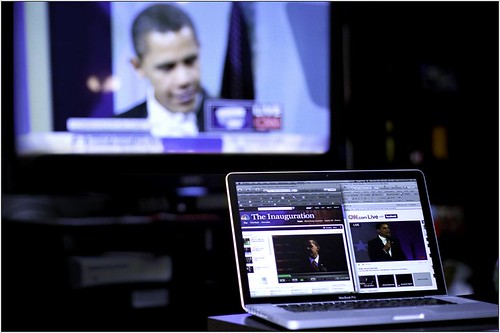



From left to right
- Kevin Roach: Vice President and director of U.S. Broadcast News for the
Associated Press in Washington.- Terry Heaton: Senior Vice President of Media 2.0 for Audience Research and
Development in Fort Worth, Texas- Lane Michaelsen: Director of the Information Center at WUSA-TV in
Washington.- Susana Schuler: Vice President of news for Raycom Media.
- Bob Papper: Professor in Hofstra University’s Department of Journalism
The presentation started with a video called EPIC 2015. It is what some predict the future of news and journalism to become.
“The news wars of 2010 are notable for the fact that no actual news organizations take part, googlezon and Microsoft faces off, enhancing their services week by week…using new algorisms, googlezons computers screen stories for names, places, images and other contextual cues isolating facts from quotes and turning statistics into flexible equations. Then googlezon re-sorts, re-calculates and re-combines these scraps with our information, our blog entries, our photos, our purchases, our lives. Suddenly news is more relevant than ever before.”
It was this that sparked the Manjoo the connection. While this is only two people’s interpretation of where news will be in the coming years, the way it is presented is very believable. That quote from “EPIC 2015” above is what selective exposure is all about. People can find whatever news they are looking for whenever they want it, with whatever spin of viewpoint they are looking for. And while this may infuriate news organizations and journalists, it is the basis of the uber-successful, money-making giant,
Then the discussion began.
I’m sitting there listening to the majority of them speak of how gloomy the outlook was and then Mr. Papper chimed in with a completely different tone. He pulled up chart after chart of research proving his ideas, but the others had research to prove their points. As a worried student I wanted to believe Mr. Papper because he said T.V. is not going anywhere. It will always be the most popular medium.
I jotted down a list of terms to research on my own to make my own conclusion. Was Bob’s research a victim of selective perception? Were the other four distinguished professionals a victim to this?
My immediate thought was no way, that is impossible. These are trained news professionals; could they really be sucked into Manjoo’s theory?
Bob Papper started the discussion with some figures. He said 2008 saw a 4.3 percent drop in T.V. jobs; but he went on to say “T.V. isn’t in serious trouble.”
Sitting to his right, Jill Geisler opposes saying “TV is in trouble. Economy isn't everything. Advertising models have changed. Advertisers can reach people without TV.”
Now that is selective perception at its finest. They were looking at the same research, the same number but both had completely different take-aways.
This went on for a little over an hour. Everyone but Papper had a less than positive outlook for the local news business, but Papper stuck with his own views. “Before you give up on TV - look at the numbers, an average 18-24 spends 236.9 min per day watching TV.”
He argued that the eyeballs where still there, they were still watching the box in front of them, so maybe the problem is the content. Maybe the quality of local news is something undesired. Papper used that as the basis of what needs to happen for broadcasting to stay alive.
After listening to all of this and not knowing if I should feel relieved or panicked, I decided to put Manjoo’s selective exposure and perception to the test.
I am a soon to be college graduate feverishly searching for a job in the broadcast industry. I don’t want to hear that it is falling apart so I chose not to believe that. I see the signs differently. In fact I see the blogs and twitter and the new technology as an enhancement to local news. Just to support my argument I went on a search.
I opened Google and typed in “Bright future for Local T.V. News.”
Just as I suspected I am right.
Everything is fine. The industry will be fine and I have nothing to worry about. News Has a Bright Future; author says on CNET news tells me everything is fine. Author Steven Johnson has no worries.
"Many people are panicking as newspapers fail left and right, and as they see the likelihood that as a result, the crucial newsgathering role played by professional journalists will disappear with their dying employers. Said Johnson, yet the example set in technology journalism should give such pessimists something to feel good about."
Then I typed into Google, “bad future for local TV news,” and this is what I found;
Rosenblumtv.wordpress.com has a completely different story. While is spoke of the collapse of the traditional television news, it also offered some bright light to where it would go because “Local news is not dead, it is just going to change. A lot.”
So Manjoo and his theory of selective exposure and selective perception is really not a theory at all, instead it is fact.
There evidence everywhere.
So what do you believe?
No comments:
Post a Comment